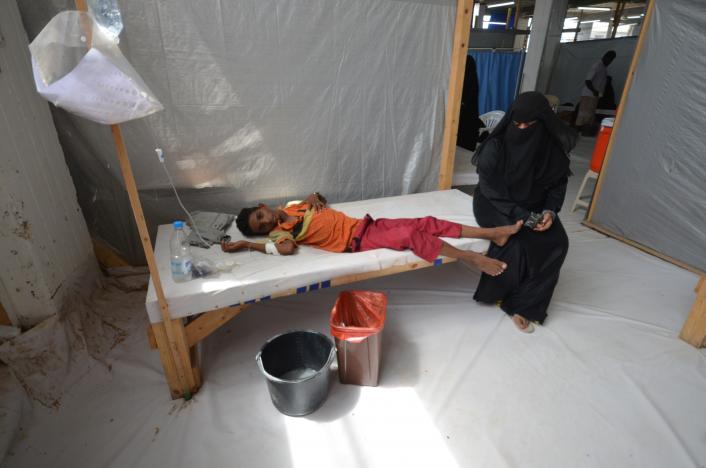Aden – Yemeni ministry of health established a central operations room in the temporary capital Aden, and several sub-rooms and reception centers for cholera cases all over the country, according to Health Minister Undersecretary Ali al-Walidi.
The government opened 40 centers in 15 governorates and is distributing medicines, medical supplies, and medical solutions, he told Asharq Al-Awsat newspaper.
Cholera is an acute diarrhoeal disease that is transmitted through contaminated drinking water. It can be fatal within hours if left untreated.
Walidi asked Ministry of Water and Environment, Sewage Treatment Plant Company, and local authorities to do an exceptional work to fight the epidemic. He reiterated that the ministry is in contact with international partners like the World Health Organization (WHO) and UNICEF to contain cholera. He described some of the cases as mild and medium with some scary cases.
The undersecretary added that the ministry is in contact with the health staff all over the country that is working in coordination with the legitimate authority in Aden.
Concerning areas under Houthi control, Walidi stated that the militias tampering with the governmental institutions, including the ministry of health, has helped spread the epidemic. He also said that other factors like garbage and sewage water in Sanaa also increased the outbreak.
In a related matter, medical sources in Yemen stated that several death cases have been reported in Hodeidah governorate, west of Yemen. The coastal governorate, Hodeidah is the second largest infected with cholera in the country following Sanaa. The city suffers from a scary outbreak of the epidemic, especially that citizens live in tough economic situations and lack of potable water.
In Bajel city, a number of citizens died because of cholera and the city is in no different situation than that of Hodeidah and other areas under insurgents’ control, according to Dr. Faker Amin.
Amin stated that Bajel lacks protection and medical care.
Over the past few days, cholera spread in Hodeidah and the two hospitals in the governorate can no longer contain all the cases.
Locals said they are having trouble in finding clean water and they are using dirty water.
Houthi insurgents announced a state of emergency in Sanaa and declared it a distressed city.
International Committee of the Red Cross (ICRC) stated that at least 180 people had died from the acute diarrhoeal disease since April 27 in the port city of Aden and that 11,000 more suspected cholera cases had been reported across the impoverished country.
